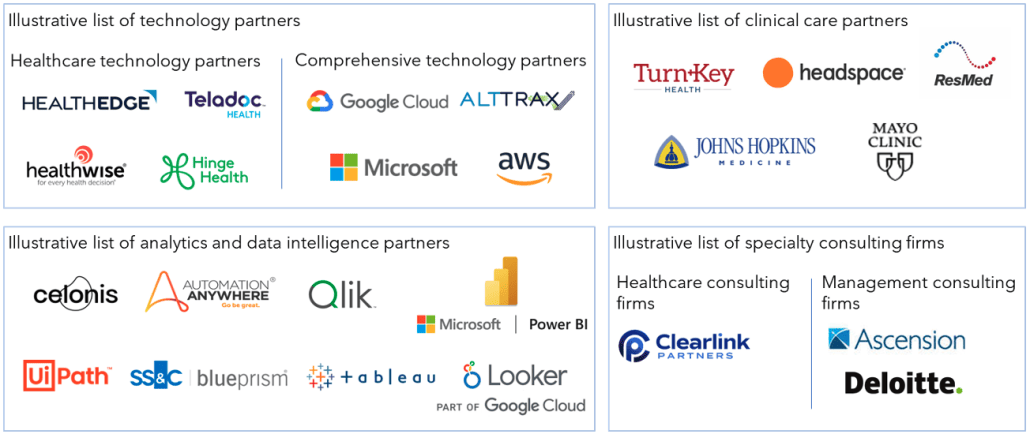In the ever-evolving landscape of healthcare delivery, clinical and care management business process transformation (BPT) service providers have emerged as key players offering a suite of services encompassing case management, utilization management, and population health management. However, these providers seldom operate in isolation; they rely on a multifaceted ecosystem of strategic partnerships to deliver streamlined and comprehensive services. This research article delves into the intricate network of alliances and collaborations that define the partner ecosystem of leading service providers, such as Accenture, Accolade, Optum, Sagility, Shearwater Health, and Wipro, shedding light on their collaborative strategies and synergies.
Categorizing the Clinical and Care Management BPT Partner Ecosystem
The clinical and care management BPT partner ecosystem can be broadly categorized into four key groups:

-
- Technology partners: These partners provide the essential software and data platforms that service providers rely on for patient management, care coordination, and operations management. Notable entities in this category include HealthEdge, Healthwise, Teladoc Health, and Hinge Health as healthcare technology partners, and Google Cloud, Microsoft, ALTTRAX, and AWS as comprehensive technology partners.
- Analytics and data intelligence partners: Service providers leverage advanced analytics platforms to predict patient risk, identify care gaps, and optimize care pathways. Partnerships with firms such as Celonis, UiPath, Automation Anywhere, and SS&C are crucial for generating insights from healthcare data.
- Clinical care partners: Service providers collaborate with specialized clinical care providers, such as home health agencies, hospice providers, and behavioral health specialists, to deliver direct care services to patients. These partnerships ensure access to a broader range of interventions and expertise. Major players in this category include Mayo Clinic, Turn Key Health, Headspace, ResMed, and Johns Hopkins Medicine.
- Specialty consulting firms: Partnerships with healthcare consulting firms furnish service providers with expertise in areas such as revenue cycle management, regulatory compliance, and change management, facilitating the resolution of complex challenges beyond their core competencies. Firms such as Clearlink Partners are categorized as healthcare consulting firms, whereas firms such as Ascension Strategy and Deloitte fall under the management consulting firm category.
Dynamics of the Ecosystem
The relationships between the service providers and their partners are multifaceted and involve varying degrees of integration and collaboration. Partnerships range from transactional engagements to deeper codevelopment initiatives and even joint ventures. The specific configuration of the ecosystem depends on factors such as the provider’s core competencies, service offerings, and target market. Technology partners furnish essential infrastructure, while data analytics and intelligence partners contribute insights. Clinical care collaborators provide specialized interventions, and consulting firms lend their expertise to enhance program efficacy and refine strategies.
Examples of Provider-Partner Relationships
-
- Accenture hosts its Health Insights Platform on AWS to gather data-driven insights that enhance healthcare service quality. The platform empowers states to share data across agencies, enabling a more comprehensive view. This leads to better health outcomes for people and communities, improved care program effectiveness, and greater operational efficiencies.
- CareCentrix collaborates with Turn Key Health to expand its post-acute care solutions by including palliative care. This provides a more comprehensive solution to patients without having to deal with multiple service providers. Additionally, strategic partnerships with Qualcomm Life, ResMed, and King’s Daughters Medical Center bolster CareCentrix’s connected health solutions through Qualcomm Life’s 2net and HealthyCircles platforms.
- Cognizant partners with leading technology service providers, such as Automation Anywhere and UiPath for automation, Tableau and Microsoft Power BI for business intelligence and visualization, and Microsoft and AWS for cloud services, leading to more robust solution offerings that have analytics and automation capabilities and higher scalability.
- HealthHelp has partnered with Covera Health to expand radiology benefits management services with advanced analytics and data-driven solutions. The partnership aims to enhance the quality of patient care and optimize the use of healthcare resources while reducing costs.
- Quantum Health partners with Headspace Health and Magellan Health for behavioral health-related services; Cariloop for a care support platform; KidneyLink, Hinge Health, and Oshi Health for multiple specialties such as kidney, gastrointestinal, and musculoskeletal diseases; and Teladoc Health for behavioral health, diabetic devices and support, expert second opinion, and virtual primary and urgent care. This enables the provider to offer a wide range of services to patients without investing heavily in developing in-house capabilities for each of these services.
Challenges and Opportunities
The clinical and care management BPT partner ecosystem presents both challenges and opportunities. Challenges include managing complex interdependencies, ensuring data security and privacy across different platforms, and aligning incentives among diverse stakeholders. However, successful collaboration within the ecosystem can unlock significant opportunities.
-
- Enhanced care delivery: By combining their strengths, providers and partners can deliver more comprehensive and coordinated care, improving patient outcomes and reducing healthcare costs.
- Innovation and scalability: Collaboration fosters innovation, developing new care models and technologies that can be scaled to reach a wider patient population.
- Market reach and expertise: Partnerships expand the reach of service providers, allowing them to serve diverse client segments and tap into specialized expertise they may not possess internally.
Outlook
In the ever-evolving landscape of healthcare, clinical and care management service providers and their partners are poised to assume a pivotal role. As the growing demand for cost-effective and efficient care delivery continues, providers are at the forefront of innovation. By fostering deeper partnerships, leveraging cutting-edge technology, and continuously innovating, service providers become critical to the healthcare delivery ecosystem, ensuring improved outcomes for patients, providers, and payers.
By Haril Sadhu, Senior Research Analyst, and Aditya Jain, Research Leader

